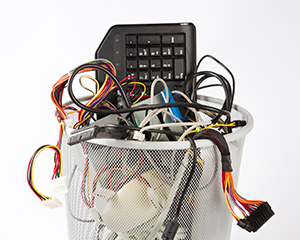
Featured Image: iStock.com/Gewoldi
“Hands up! You are under arrest…for e-litter.”
This might happen to you if you are living in Pennsylvania. That’s right. So if you are planning on throwing away your old electronic items (replacing with the new ones you got over holidays), think again.
Pennsylvania’s Department of Environmental Protection (DEP) enforced the ‘Covered Device Recycling Act, 2010’ on January 24th 2013, that effectively bans landfill disposal of electronics appliances.
Covered Device Recycling Act, 2010 specifically prohibits all residents of Pennsylvania as well as small businesses having less than 50 employees to dispose covered electronic devices. The fines for breaching the law range from $1,000 for the first offense and goes up to $2,000 for subsequent violations.
As the name suggests, the law clearly bans dumping of all electronic “Covered device.” By definition, a covered device could be a computer or television marketed and intended for use by a consumer. To go into detail, here are a few things that are banned to be disposed off:
1. Covered computer device – This includes your desktop PC, laptop, notebook, computer monitor or LCD that is promoted and deliberated for use by consumers.
2. Covered television device – This includes all kinds of television sets based on cathode ray tube, plasma, liquid crystal, digital light processing, liquid crystal on silicon, silicon crystal reflective display, light emitting diode and other such technology intended for consumer use.
3. Peripheral – This includes all computer peripheral devices that provide input/output like keyboard, printer, mouse, speaker, headphone, web camera, scanner etc.
Furthermore, the law also directs manufacturers of electronic devices listed above to place systems to recycle the electronics. Failing to comply may result in fines ranging from $10,000 fine for the first violation and $25,000 for subsequent violations. This shifts the nous of recycling obsolete electronics on the producer thus making it easier for consumers.
So the question is…how do you dispose of your old electronic items without facing penalties or fines? There are more than one ways of doing that depending upon how much time you want to invest in e-waste management. Some of them are listed below:
1. You can check with your local municipality to see if they offer you curbside electronics recycling services. However, you may have to take your e-waste and drop-off on a specified location for further processing.
2. Many retail stores and outlets offer recycling services (some even for free) like Best Buy, Staples and Salvation Army. However, you need to call and confirm what types of electronics they accept and take it to them.
3. If you are the type who can invest some money into having the e-waste recycled, you can take your items to permitted electronics recyclers in your area who do it for certain service charges.
4. If you want to get rid of your e-waste in a convenient, hassle-free manner and that too for free, then try Hummingbird International, LLC. Simply get in touch with us via our ‘Contact Us’ page or drop an email at contact@hummingbirdinternational.net and we will have your e-trash collected and recycled for you and that too for absolutely free of charge. Oh and did we mention we are based in Pennsylvania?
So are you abiding by the Pennsylvania ‘Covered Device Recycling Act’? Or are you guilty of violating it? If so, then it still isn’t too late to make amends and avoid getting penalized.
Kelly Sampson is a writer, blogger, and environmental enthusiast. She has strong opinions about climate change, the dogs vs. cats debate, and Oxford commas. She has lent Hummingbird International her engaging and spirited voice and turned our blog into a great place to find valuable information about e-waste, e-waste recycling, and the ITAD industry. Explore our blog to read more of her work.